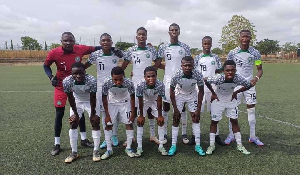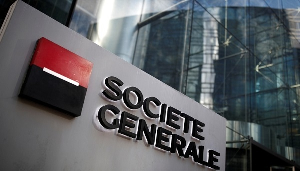- Home - News
- TWI News | TV
- Polls
- Year In Review
- News Archive
- Crime & Punishment
- Politics
- Regional
- Editorial
- Health
- Ghanaians Abroad
- Tabloid
- Africa
- Religion
- Election 2020
- Coronavirus
- News Videos | TV
- Photo Archives
- News Headlines
- Press Release
General News of Tuesday, 17 April 2007
Source: GNA
Prof. Bekoe calls for planning for energy supply
Accra, April 17, GNA - Professor Daniel Adzei Bekoe, Chairman of the Council of State on Tuesday said the energy shortage in developing countries was a serious impediment to development as well as efforts to eradicate poverty.
He therefore called for the planning of energy supply and implementation in a systematical way to support development. Speaking at a press conference in Accra on Nuclear Power and the current energy crises, he said, 93Comparisons of per capita electricity use per year between developing countries and developed countries clearly show the handicap that we are faced with.
"The African average is 514; for Latin America 1,534; for the Organisation of Economic Co-operation and Development (OECD) Countries 8,046 with the world total average standing at 2,373".
Prof Bekoe, who is also the Chairman of the Ghana Atomic Energy Commission said if Ghana was to fully utilize its hydro and thermal capacities, 93We would not be in crisis,=85. but unfortunately we cannot guarantee that our dams will always have enough water, or that oil and gas will be readily available.
"Unless we have other sources of power available, our power security will remain suspect and subject to the occasional crises, such as we have now" he said, adding that "the greater the variety of sources from which electricity can be generated, the more secured we shall be in the provision of electricity".
He said from observation, 16 per cent of the total world' s electricity generation was from nuclear power plants, with this percentage being fairly constant over the past two decades. Prof Bekoe said this means that as the electric power demands of the world increased, generation from nuclear and other sources had been increasing in the same proportion.
Enumerating the percentage use of nuclear electricity generated in a few countries, he cited France for instance as deriving 80 per cent of its electricity from nuclear, 20 per cent for USA, 16 per cent for Russia, 45 per cent for the Republic of Korea and 45 per cent for South Africa.
He said there were 442 Nuclear Power Plants in some 30 countries and that except for South Africa, no African country had a Nuclear Power Plant.
"Nigeria is however planning its first nuclear power Plant," he said.
Prof Bekoe said Ghana could therefore run a nuclear power plant, based on its ability to manage several new technologies, including the Akosombo, which Ghanaians had not had the experience of running before it came.
"We have additional experience in the application of several nuclear techniques at Kwabenya, Korle-Bu and Komfo Anokye hospitals and the Cocoa Research Institute of Ghana at Tafo," he said.
He said if Ghana decided to go for nuclear energy, the International Atomic Energy Agency was ready to help since it had already given an assurance that 93for those member states that choose to use nuclear power, there is much that the Agency can do to make this option accessible, affordable, safe and secure".
Prof Bekoe said GEAC could not speak for government but what he could say as chairman of the Commission was that the president had for the past few years been showing a cautious interest in the subject. "This interest has intensified in recent months and it has been demonstrated by Government's significant financial support for the establishment, jointly by the GAEC and the University of Ghana the Graduate School of Nuclear and Allied Science to train personnel for several aspects of the use of nuclear energy for Ghana and other African states". 17 April 07










